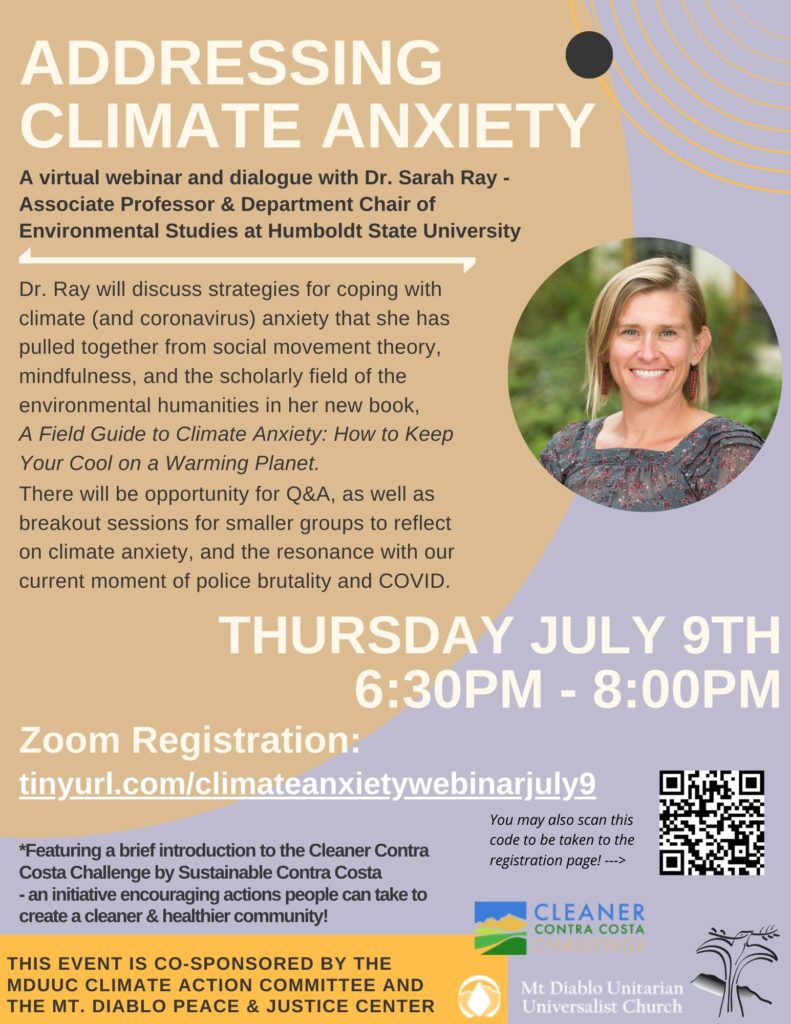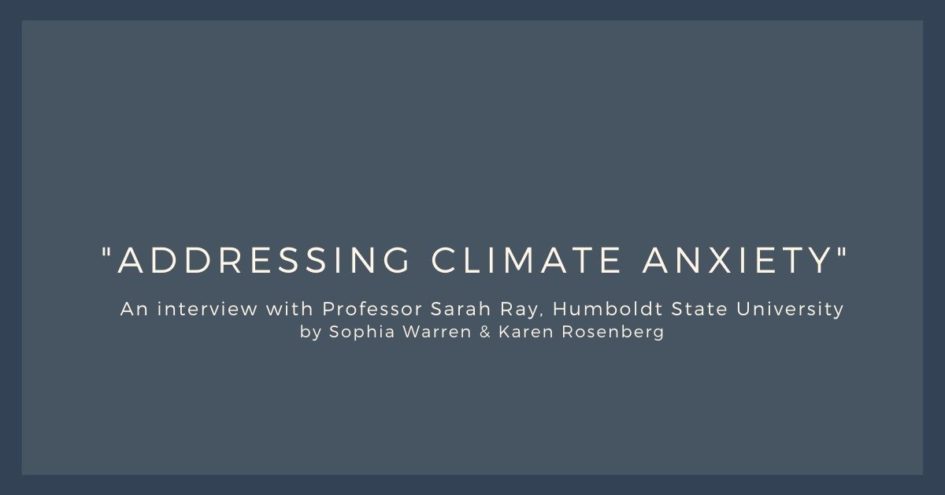On Thursday July 9th, the Peace Center will be hosting our first ever webinar in collaboration with the MDUUC Climate Action committee. We are excited to welcome Professor Sarah Ray, Department Chair of Environmental Studies at Humboldt State University. Her work focuses primarily on the relationship between emotions and effective climate advocacy, as well as other environmental issues. Climate or eco-anxiety is described by the American Psychological Association as “a chronic fear of environmental doom” which can lead to feelings of hopelessness, depression, and anxiety. Sometimes activism work can feel like pushing a boulder up a hill. Beyond just hope, how can we fight and strategize for a better future without overwhelming ourselves in the process? What strategies can we use to re-frame the way we look at movement work? How do we find a balance?
As we look forward to Thursday’s webinar, two of our college interns – Sophia Warren from St. Mary’s College and Karen Rosenberg from Diablo Valley College – had the opportunity to ask Professor Ray some questions about her work.
On Thursday, Professor Ray will have the opportunity to expand on these ideas as well as participate in an active dialogue with webinar participants. This webinar is intended to be engaging and collaborative – we welcome your thoughts and questions!
Peace Center (PC):
What is the most important thing you would tell someone who is dealing with climate anxiety?
Professor Sarah Ray (SR):
To NOT feel anxiety about the climate, COVID, and police brutality would mean that you’re not really living in this country, on this planet. So first, recognize that your feelings are appropriate for the context. Second, understand the historical context of feeling anxiety; what has anxiety meant in the past, in your culture, in the present? Why is it stigmatized, why is it presented as something that is only pertaining to the individual, rather than blamed on social structures? Why is “happiness” prized, and is that really a good thing? Why is vulnerability considered “weak”?
All of these questions are about gaining emotional intelligence, and so that’s the second thing– study emotional intelligence and figure out the role of your emotions in engaging the work of climate advocacy. Despair, anger, apathy, guilt– these are feelings that are useful because they signal to us what we care about, but they are not effective for long-term action. Fiercely protecting your mental health and psychological resilience is no joke. It’s not an indulgence; rather, it is the core of resistance.
The story you live from, the media you consume, the ways you perceive your action in the world, your ability to resist burnout– these are the things the planet needs from you. If you really care about climate justice, you’ll make sure you have enough reserves at all times to fight for it.
PC:
In your eyes, how can the climate movement become more intergenerational? In other words – in what ways can both the younger generation and older generation of activists support one another?
SR: The younger generation could learn from the older generation that some of these battles have been fought, and learn some of the hard-won achievements, the legacies of political debates, and, of course, the history of environmentalism in the U.S, including the ways it includes (and doesn’t include) climate, and the ways that it has mostly excluded social justice. This history is really important.
The older generation I think doesn’t fully understand the younger generation’s relationship with these issues. They think that kids these days don’t care enough or need more cajoling into caring; this is a slap in the face to young people who are gripped by the imminence of planetary destruction. The rhetorical strategies used by past environmentalists are not effective with younger activists.
For example, doom-and-gloom, guilt-laden calls for sacrifice and lifestyle changes are not the changes that young people think are needed. The interconnections with social justice are another level where the younger generation has insights that for the most part are not evident in the older climate generation. Young people, even despite political party, overwhelmingly care about climate change; that’s not the same with the older generation, which is split along party lines.
PC:
How do you work to emphasize / address subjects such as environmental justice and racism in your classroom?
SR: Lots of ways: one, which is the obvious thing, is the what of what I teach: I teach material by people of color on environmental topics, and I teach environmental justice and indigenous scholarship and history. But probably the more important way to integrate these insights is through pedagogy, or how I teach.
I center students’ intelligence instead of treating them as empty brains. I structure class time around what students want to do, or around student-led work. I make sure our class time models what I expect them to do in their careers and lives. I make sure they have as much time to reflect and contemplate how the content is resonating with them as I do “testing” their retention of that knowledge; in fact, I don’t much more ever test retention of knowledge. I test application: “What does this case study mean for you and your life?”
Recently, I’ve also begun to try to push myself to stop centering the white student perspective in the class. Environmental studies students have been historically white, but that’s not the case anymore, which shouldn’t be surprising, as more Latinxs and Black people care about the environment than white people. Decentering whiteness is an ongoing challenge for me, and probably one of the most important strategies for teaching about environmental justice. The loudest voices in the class don’t necessarily represent the class; they are just the people who have been taught that their voice matters.
PC:
In what ways, if any, do you feel your teaching tactics will change permanently in regard to the pandemic?
SR: Insights I had from research on climate anxiety about students’ trauma and emotional state, and how they’re central to their ability to learn and succeed, are only more obvious now. I had already leaned in the direction of trauma-sensitive pedagogy; I will do so more now. I had already leaned on trying to figure out ways to prioritize community-building in my pedagogy; that seems even more important under conditions of physical distancing. But relationships are the webs that will hold us up in crisis, as research for my book showed (one chapter is called “Be Less Right and More in Relation”) and so I will continue to push hard on integrating that into my pedagogy. Of course, going online will present all kinds of new challenges and opportunities; how to center relationships when we can’t physically see each other? But this will be my main focus. Social capital, relationships, community resilience– that’s the number one skill of our time.
PC:
Are there any unexpected takeaways from your book that shed light on our future with Coronavirus?
SR: Many! Like the one I described above– about the number one skill of our time being community resilience. Also, the interconnectedness of problems– “I can’t breathe” is about police brutality and the prison industrial complex, but you can’t separate that from environmental racism, the siting of prisons on toxic lands, the disposability of some people and some places, and the uneven impact of climate change–including how it unleashes more infectious diseases like COVID–on people of color.
That analysis of how capitalism, colonialism, and power affect social and environmental justice is poignantly clear in a COVID and BLM context. I make the case in my book that Generation Z is the first to really see these connections, and the fact that protests for racial and climate justice are led by youth attests to the importance of this generation’s resilience. Now more than ever do we need them to have the interior resources to engage in this fight for the long haul.
We would like to extend a huge thank you to Professor Ray for her thoughtful responses and for making time to speak with us. We are ecstatic for the webinar on Thursday and hope to see you there!
TO REGISTER FOR THE WEBINAR:
tinyurl.com/climateanxietywebinarjuly9
Full flyer:

